The COVID-19 pandemic and its impacts are still being felt today, whether this be in those who tragically lost loved ones or those who still suffer long-term health issues. The financial consequences, apart from the additional huge burden of debt, have been disruption to the global supply chains and the return of inflation, which prompted the increase in global interest rates. The lesser-known consequence of people sat at home during lockdowns was a whole generation of new investors exploring the financial world, unaided and tempted by the spoils available through social media and online investment apps. Simon Durling, from Santander Asset Management, shares his thoughts in this week’s State of Play.
Key highlights from this week’s State of Play
- New generation of investors
- Too good to be true
- Latest UK employment update
- Market update
New generation of investors
Cast your minds back over three years to the beginning of the pandemic. The initial panic about COVID-19 triggered unprecedented restrictions, asking us to stay at home for an extended period to protect the NHS, slow the spread of the virus and buy time to develop new vaccines. We stayed at home, unable to spend money on holidays, go to the cinema or go to restaurants, instead supplementing our savings in the face of uncertainty or increasing our spending online.
Household saving as a percentage of disposable income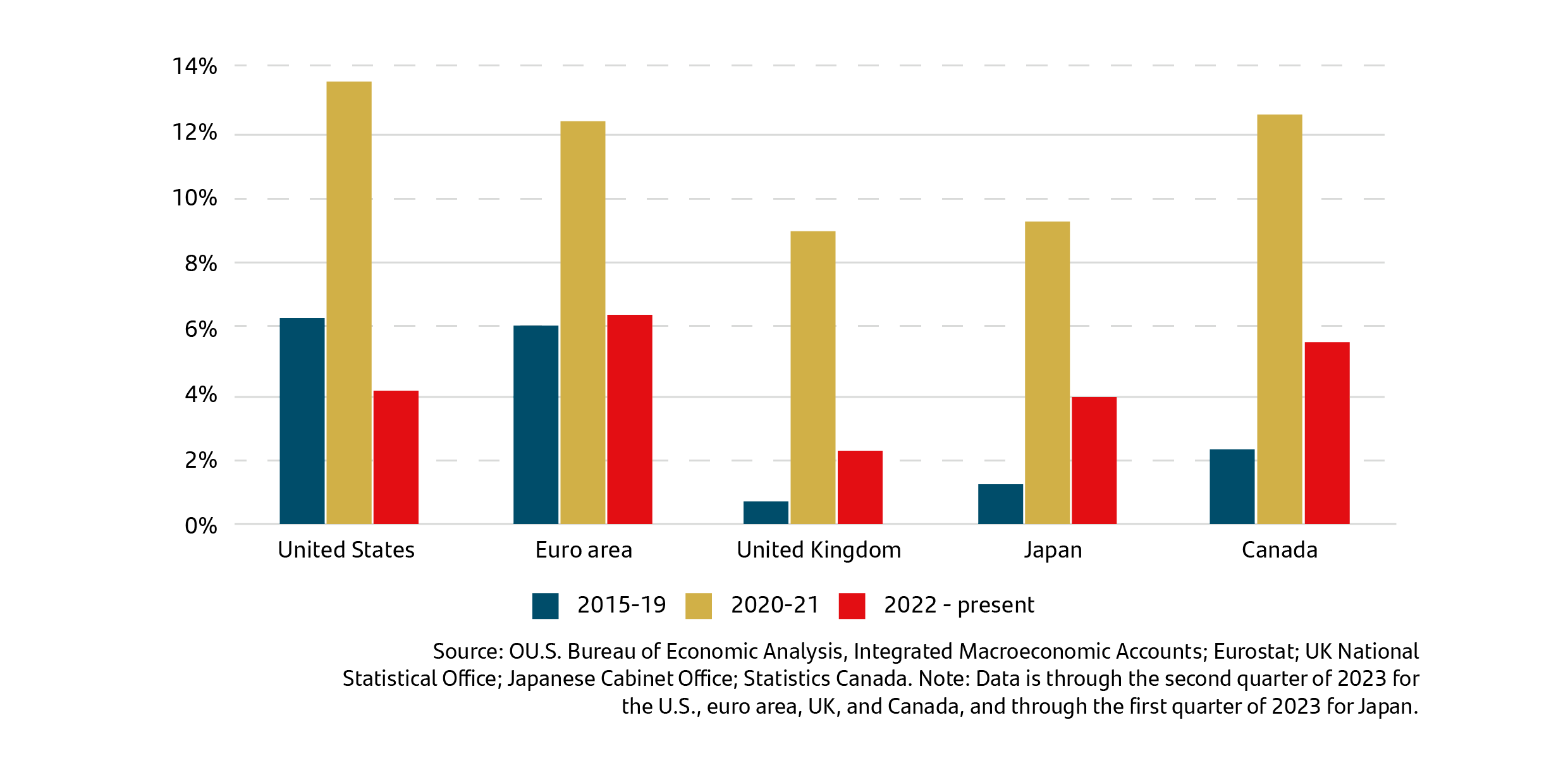 During this period, the amount squirrelled away into savings soared (see the chart above) and those with time on their hands and an increase in their disposable income began to look at alternatives to low interest paying savings accounts.1 Remember, this was a time when interest rates in the UK were cut to just 0.1%, meaning any savings attracted very little interest. Fortuitously this savings buffer appears to have contributed to economic resilience, as consumers have used these savings to cushion the blow of rising prices, but many have taken their first steps into the world of investing. According to a survey from US stockbroker, Charles Schwab in 2021, 15% of the retail investor market in the US began investing in 2020.2
During this period, the amount squirrelled away into savings soared (see the chart above) and those with time on their hands and an increase in their disposable income began to look at alternatives to low interest paying savings accounts.1 Remember, this was a time when interest rates in the UK were cut to just 0.1%, meaning any savings attracted very little interest. Fortuitously this savings buffer appears to have contributed to economic resilience, as consumers have used these savings to cushion the blow of rising prices, but many have taken their first steps into the world of investing. According to a survey from US stockbroker, Charles Schwab in 2021, 15% of the retail investor market in the US began investing in 2020.2
Too good to be true
There is a similar story in the UK, with the Financial Conduct Authority (FCA) expressing concerns about how many new investors chose to invest post-pandemic without help, advice, or any guidance into investments that were often high-risk and not fully understood.3 At the time, the FCA’s chief executive, Nikhil Rathi, said: ‘The big internet companies need to take greater responsibility for their role in connecting consumers with these investment offers. Too many of the investment opportunities that people are finding online prove too good to be true. We are looking at how social media sites are adapting to new rules on financial promotions and if needed, we will take action.’
The regulator said these were often younger and more diverse DIY investors making riskier choices because they liked the challenge, the thrill, and the status, often swayed by the influencers they followed. In a world where social media plays such an important role in influencing behaviour, investments like Crypto Currency, Non-Fungible Tokens (NFTs) and other investment schemes were advertised on various investment apps or social media sites ,often backed by famous celebrities, looking to attract a new generation of investors. In addition, companies that benefited from the dramatic changes in consumer behaviour during the pandemic became stock market darlings, with their share prices rocketing, driven by demand from new investors wanting to share the ride, with some crashing back to earth when life returned to somewhere near normal.
The following example is not designed to focus on whether Peloton was or is now a suitable share to invest in or not, nor whether their share price is undervalued or overvalued, as this would require a detailed analysis that is not appropriate or related to the purpose of this update. I use this example simply to highlight the consequences of the pandemic, the change in consumer behaviour it triggered and how this may have influenced new investors attracted to what may have appeared to be an investment which is ‘too good to be true’. Peloton is a technology and fitness equipment maker that benefited from people who were keen to continue their fitness at home during lockdowns when gyms had to close. The surge in demand for their services prompted a sharp rise in their orders, attracting new investors and pushing up their share price from the float price of just over $25 to a high of $167 before dramatically falling when restrictions ended and consumer behaviour returned to normal. Had you invested at the highest price, you would be nursing significant losses, with the share price now close to just $5. In past editions this update has covered the emotions and biases of investors, this is, in my view, is a clear example of herd mentality, motivated by trying to make a quick profit.
Peloton share price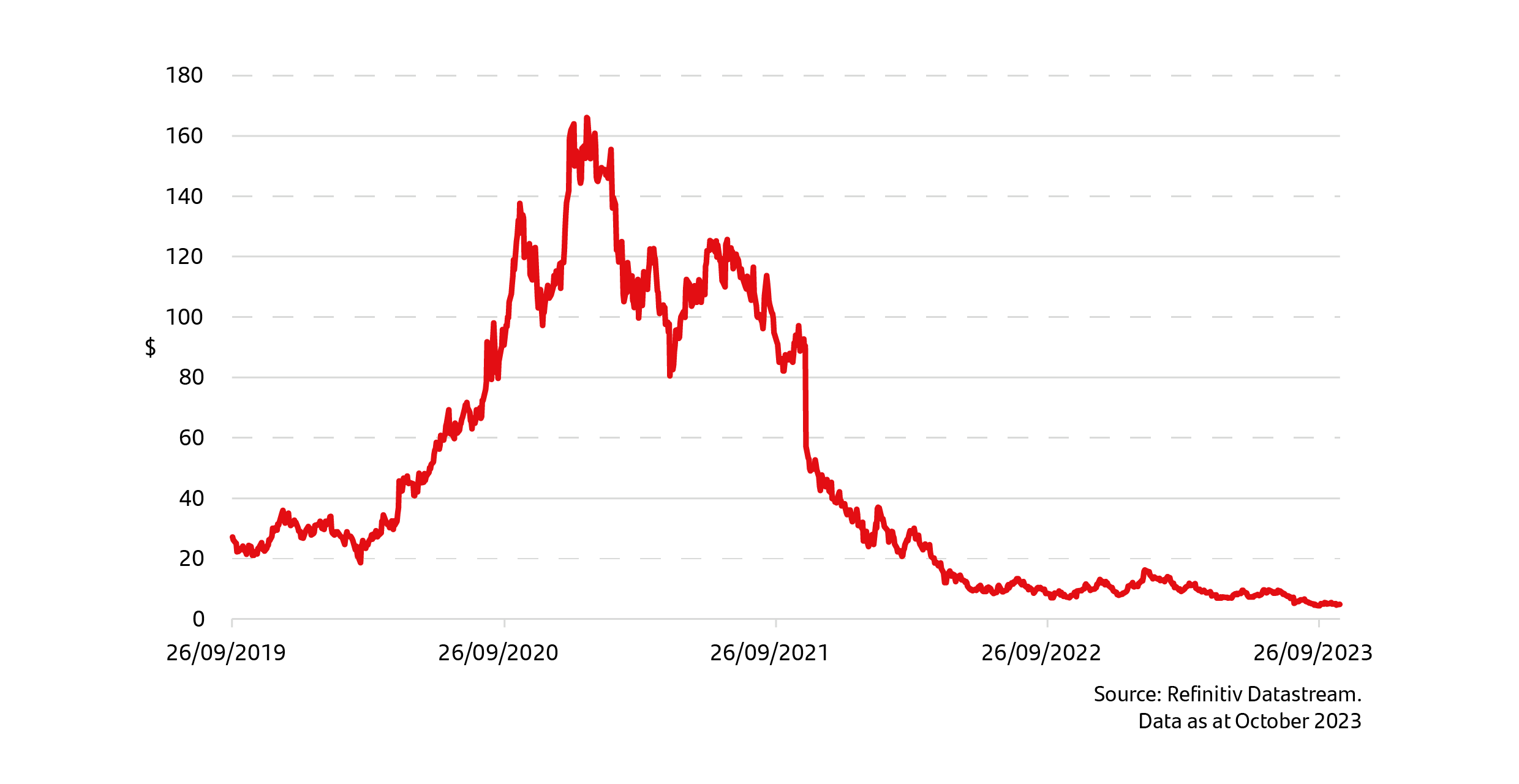 Since the pandemic, the UK regulators have introduced new regulations to protect investors, including Consumer Duty in July this year. Consumer Duty is designed to provide support to investors when they need it, communications that can be easily understood and products and services that meet clients’ needs while offering fair value.4 The pandemic has sparked a brand-new generation of investors who have found very different routes to investing, often unaided by any advice or guidance, and for some, with painful consequences. As always, if you are unsure, reach out and seek advice from your professional financial adviser.
Since the pandemic, the UK regulators have introduced new regulations to protect investors, including Consumer Duty in July this year. Consumer Duty is designed to provide support to investors when they need it, communications that can be easily understood and products and services that meet clients’ needs while offering fair value.4 The pandemic has sparked a brand-new generation of investors who have found very different routes to investing, often unaided by any advice or guidance, and for some, with painful consequences. As always, if you are unsure, reach out and seek advice from your professional financial adviser.
UK employment update
This week, according to the Office for National Statistics (ONS), unemployment in the UK in the three months to August rose 0.2% to 4.2% with a 20,000 increase during the period. Ordinarily, this data is released at the same time as the wage rise information. However, due to difficulties with the Work Force Labour Survey, the ONS has changed course, explaining in their report: ‘Because of the increased uncertainty around the Labour Force Survey (LFS) estimates, today we are publishing an alternative series of estimates of UK employment, unemployment, and economic inactivity as experimental statistics. The experimental figures were derived using growth rates from Pay as You Earn Real-Time Information and the Claimant Count for the periods from May to July 2023 onwards. Experimental estimates for June to August 2023 show a 0.2 percentage point increase in the UK unemployment rate to 4.2% compared with the previous quarter (March to May 2023).’
UK unemployment rate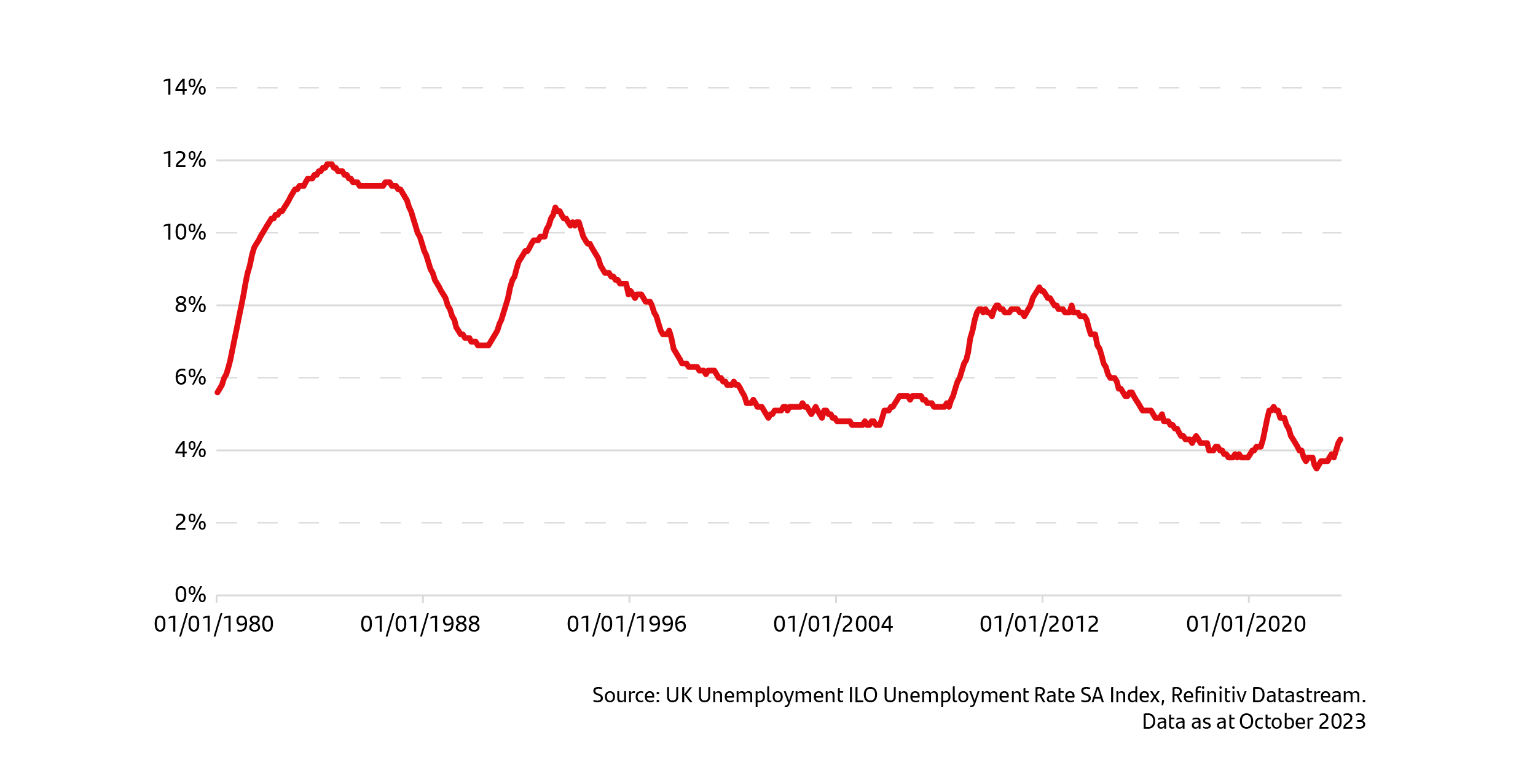 These figures may provide some comfort to the Bank of England, due to meet next Thursday to decide on interest rates. Oddly, although these figures were marginally better than anticipated, the aim of rising interest rates is to cool the economy and the job market. Had unemployment increased by a higher amount, this would have provided stronger evidence to the Monetary Policy Committee (MPC) that the tight jobs market (which has driven high wage rises) was showing stronger signs of cooling. However, this data, alongside the fall in inflation in recent months, shows evidence that the medicine of higher rates is finally working, leaving expectations that the MPC will leave rates unchanged.
These figures may provide some comfort to the Bank of England, due to meet next Thursday to decide on interest rates. Oddly, although these figures were marginally better than anticipated, the aim of rising interest rates is to cool the economy and the job market. Had unemployment increased by a higher amount, this would have provided stronger evidence to the Monetary Policy Committee (MPC) that the tight jobs market (which has driven high wage rises) was showing stronger signs of cooling. However, this data, alongside the fall in inflation in recent months, shows evidence that the medicine of higher rates is finally working, leaving expectations that the MPC will leave rates unchanged.
Market update
A combination of factors last week led to a full house of red numbers as stock markets around the world fell in value as sentiment turned more fearful. Strong US retail data alongside better than expected jobless claims evidenced a stronger economy than the Federal Reserve would like, given how much interest rates have risen. This ‘higher for longer’ concern of the market triggered not only a fall in share values but also a sharp rise in bond yields, especially longer-term bonds, as the US 10-Year Treasury yield reached 5.02%, the highest since 2007.5 Data compiled by Blackrock showed that investors have been flocking to invest in bond funds during the last three months, but importantly, because they can access higher yields without having to commit to much longer timeframes, long-term bonds values have continued to fall.6 Today will see the US economic growth figures released, with all eyes on how hot the numbers will be. If, as expected, the numbers point to an economy that continues to defy higher interest rates, then the pressure on the Fed for next week’s decision on interest rates will build. Today will also see the European Central Bank (ECB) make its decision on rates and the Bank of England will do so next Thursday. At such a pivotal time in the economic cycle, investors nerves are sensitive to any new news and the possible implications.
The value of seeking guidance and advice
It is important to seek advice and guidance from a professional financial adviser who can help to explain how to build an appropriate financial plan to match your time horizons, financial ambitions, and risk comfort. If you already have a plan in place, or have already invested, it is important to allocate time to review this to ensure this remains on track and appropriate for your needs.
Performance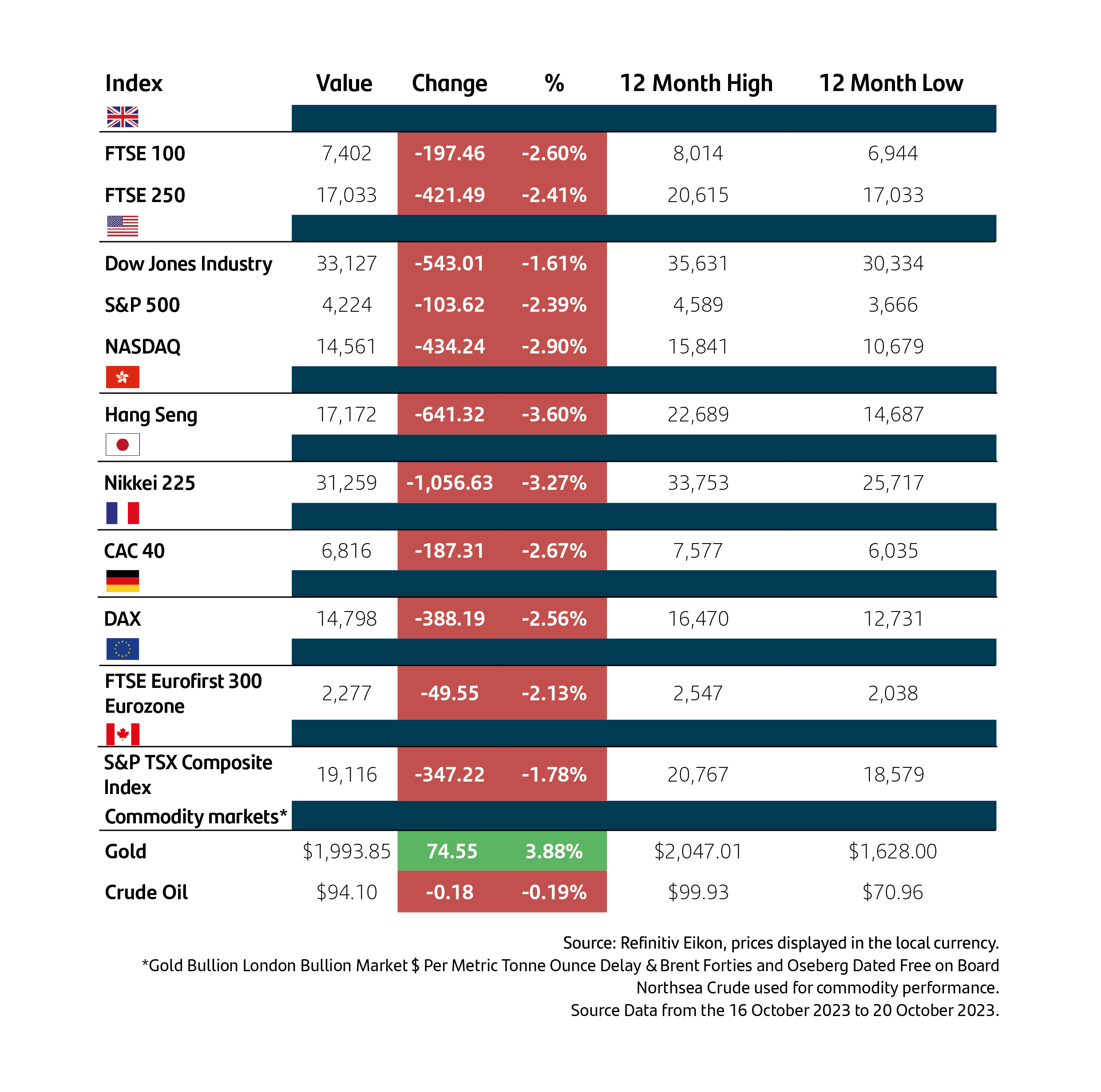 10-years bond yields
10-years bond yields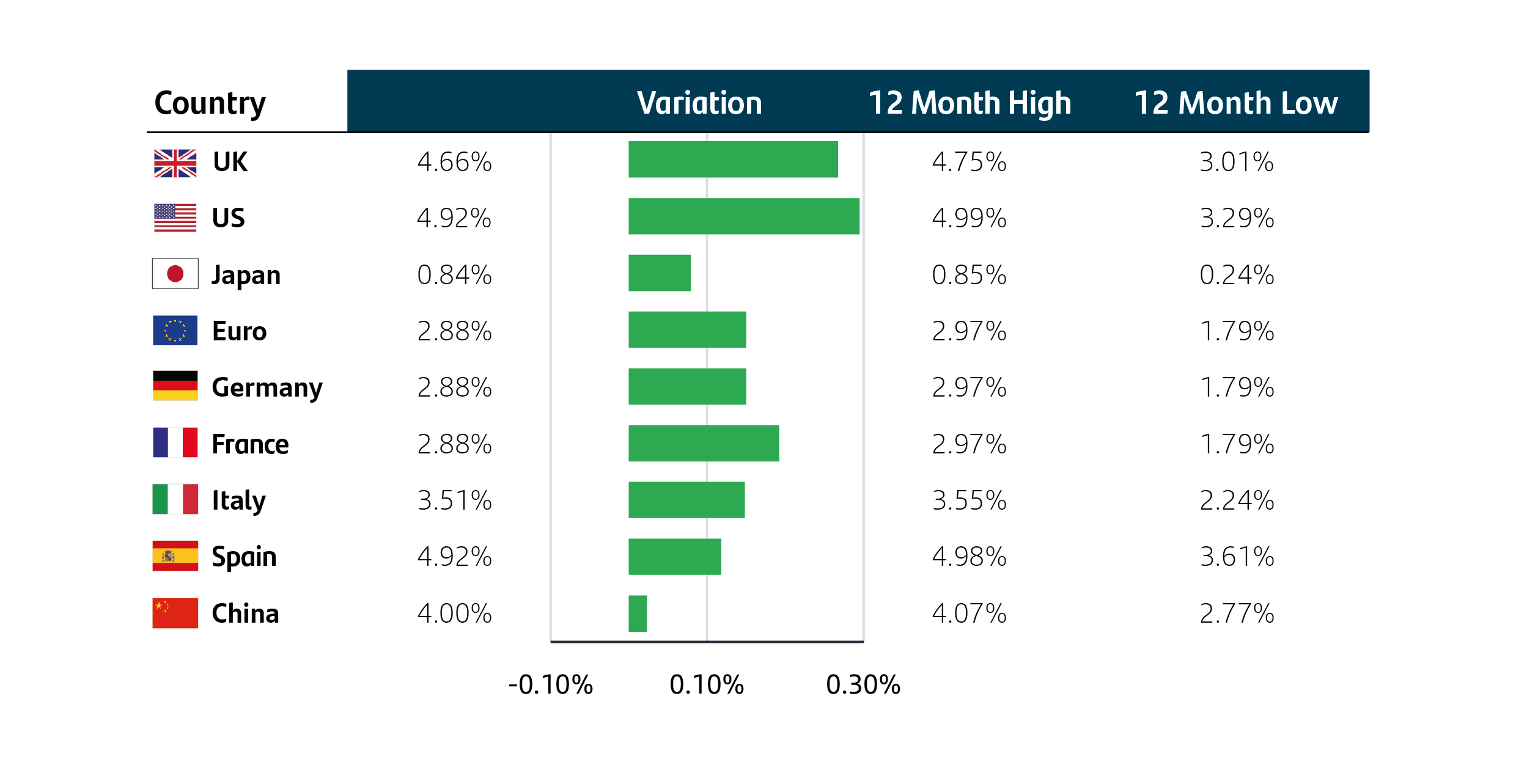 Currencies
Currencies

Investing can feel complex and overwhelming, but our educational insights can help you cut through the noise. Learn more about the Principles of Investing here.
Note: Data as at 26 October 2023. 1Liberty Street Economics, 11 October 2023. 2CNBC, August 2021. 3Guardian, 20 April 2021. 4FCA, 8 September 2023. 5The Times, 24 October 2023. 6Financial Times, 23 October 2023.
Important information
For retail distribution.
This document has been approved and issued by Santander Asset Management UK Limited (SAM UK). This document is for information purposes only and does not constitute an offer or solicitation to buy or sell any securities or other financial instruments, or to provide investment advice or services. Opinions expressed within this document, if any, are current opinions as of the date stated and do not constitute investment or any other advice; the views are subject to change and do not necessarily reflect the views of Santander Asset Management as a whole or any part thereof. While we try and take every care over the information in this document, we cannot accept any responsibility for mistakes and missing information that may be presented.
The value of investments and any income is not guaranteed and can go down as well as up and may be affected by exchange rate fluctuations. This means that an investor may not get back the amount invested. Past performance is not a guide to future performance.
All information is sourced, issued, and approved by Santander Asset Management UK Limited (Company Registration No. SC106669). Registered in Scotland at 287 St Vincent Street, Glasgow G2 5NB, United Kingdom. Authorised and regulated by the FCA. FCA registered number 122491. You can check this on the Financial Services Register by visiting the FCA’s website www.fca.org.uk/register.
Santander and the flame logo are registered trademarks.www.santanderassetmanagement.co.uk





